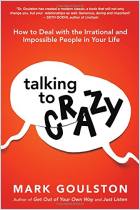Join getAbstract to access the summary!

Join getAbstract to access the summary!
Peter Favaro
Anger Management
6 Critical Steps to a Calmer Life
New Page Books, 2005
What's inside?
Control angry, self-destructive behavior by reprogramming your assumptions and perceptions.
Recommendation
Peter Favaro provides numerous tools to help those who want to get a handle on their emotions, particularly anger, and to improve their relationships with others. He is always careful to define his key terms and reinforce essential principles, and he provides example after example of difficult situations and how to deal with them. The book is well organized and full of techniques that will help you overcome frustration. Favaro’s suggestions are all useful. However, the book does not explore the risks involved in some of the techniques. While Favaro is careful to explain that not all techniques work for everyone, he downplays the possibility of negative reactions to conscientious, careful communication in many work-focused organizations, and underestimates the power of context and workplace culture. Otherwise, this is familiar but useful conflict resolution material. getAbstract recommends this book to self-help beginners who want to improve their conflict resolution skills by changing their behavior.
Summary
About the Author
Peter Favaro is a clinical psychologist who teaches anger management and conflict resolution classes, and lectures regularly on the psychology of crime.



















Comment on this summary